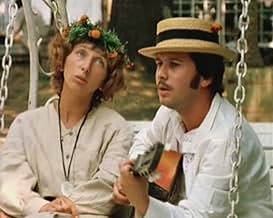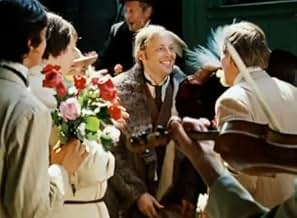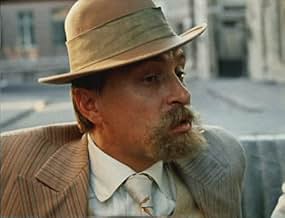IMDb-BEWERTUNG
7,3/10
1895
IHRE BEWERTUNG
Füge eine Handlung in deiner Sprache hinzuA fate of popular film actress during the turbulent years of the Russian Civil War.A fate of popular film actress during the turbulent years of the Russian Civil War.A fate of popular film actress during the turbulent years of the Russian Civil War.
- Regie
- Drehbuch
- Hauptbesetzung
- Auszeichnungen
- 1 Gewinn & 2 Nominierungen insgesamt
Konstantin Grígoryev
- Nikolay Fedotov
- (as Konstantin Grigorev)
Vera Kuznetsova
- Lyubov Andreyevna
- (as V. Kuznetsova)
Inna Ulyanova
- Aktrisa s buketom alykh poz
- (as I. Ulyanova)
Vitaliy Komissarov
- Assistent operatora
- (as V. Komissarov)
Nikita Mikhalkov
- Ivan
- (as N. Mikhalkov)
Nikolai Pastukhov
- Stsenarist
- (as N. Pastukhov)
Gotlib Roninson
- Ivan Figel
- (as G. Roninson)
Evgeniy Steblov
- Lyosha Kanin
- (as Ye. Steblov)
Mikhail Chigaryov
- Vyalin
- (as M. Chigaryov)
Aleksandr Yakovlev
- Sasha
- (as A. Yakovlev)
Aleksandr Adabashyan
- Rezhisyor nemogo kino
- (as A. Abadashyan)
Tatiana Andrianko
- Katyusha
- (as Tanya Sverchkova)
Yuriy Bogatyryov
- Vladimir Maksakov
- (as Yu. Bogatyryov)
Empfohlene Bewertungen
A fascinating film not only about the making of a silent film in Revolutionary Russia, but by extension, about the inability of humans to see beyond their primary interests, to ignore the wave of history until it all but sweeps over and engulfs them.
To a viewer accustomed to linear storytelling and sophisticated technique, this helter-skelter development of a love story between a somewhat scatterbrained actress and her quietly subversive cameraman may seem disjointed until the revolutionary movement intrudes and the violence of history intrudes into their country dream. Slave to Love is an odd little film, an immersion into the myths of another country, and while I wouldn't watch it twice, it's sincerity of purpose is evident.
To a viewer accustomed to linear storytelling and sophisticated technique, this helter-skelter development of a love story between a somewhat scatterbrained actress and her quietly subversive cameraman may seem disjointed until the revolutionary movement intrudes and the violence of history intrudes into their country dream. Slave to Love is an odd little film, an immersion into the myths of another country, and while I wouldn't watch it twice, it's sincerity of purpose is evident.
"Raba lyubvi" - called "Slave of Love" in English - portrays silent screen star Olga Voznesenskaya (Yelena Solovey) getting caught up in the 1917 revolution. She's trying to reconnect with a former lover, but the surrounding events complicate everything. What the movie's title shows is that Olga is not only a slave of love, but also of world events, of her career, and of her fans (I guess that even under communism - or whatever it was - people turn into celebrity fetishists!). As often happens in Soviet-era movies, there's a lot of exaggerated facial expressions. Director Nikita Mikhalkov appears as a waiter.
Well-acted, nicely photographed, believable, this near-melodrama is remarkable for its comparatively realistic portrayal of character and personality on each side in the Russian Civil War (which immediately followed the second Russian Revolution, Lenin's Bolshevik take-over in the Autumn of 1917). See it, though, not so much for a surprising insight into crumbling Soviet ideology in 1976 (so early!) as for a very human, very touching love story.
This movie gives great insight into the history and politics of Russia during 1916-1917. Not knowing much about these things, it gave me an inside perspective into the attitudes of both the educated activist and the naive young woman. It is interesting to see the main character change throughout the film from a happy yet self centered actress to a woman with a heavy heart. This movie struggles to keep your attention, but it is worth your while.
I am left pondering the title of this film. Is Olga a slave to the love she feels for her love interest, which pulls her into a politically charged situation she can't escape? Or is she a slave to the love of her country and for this reason abandons all hopes of going to Paris and leaving her country behind?
I am left pondering the title of this film. Is Olga a slave to the love she feels for her love interest, which pulls her into a politically charged situation she can't escape? Or is she a slave to the love of her country and for this reason abandons all hopes of going to Paris and leaving her country behind?
Despite some nice photography and a mildly amusing if cartoonish nod to pre-soviet melodramatic Russian cinema, the good/bad PC politics sink this as soon as the message kicks in. Those wonderful (and so handsome!) Bolsheviks, always out to make the world a better place for the sick and the children. Neat that they courageously go forth to document White atrocities. Too bad they didn't have enough film stock to document what the Bolchies did, eh? as in the Ukraine in 33-34.
Wusstest du schon
- WissenswertesJack Nicholson and Monte Hellman praised "Slave Of Love" highly and actively tried to get more people to see it.
- VerbindungenFeatured in Circulez y a rien à voir! (1983)
Top-Auswahl
Melde dich zum Bewerten an und greife auf die Watchlist für personalisierte Empfehlungen zu.
Details
Zu dieser Seite beitragen
Bearbeitung vorschlagen oder fehlenden Inhalt hinzufügen

Oberste Lücke
By what name was Sklavin der Liebe (1976) officially released in India in English?
Antwort



































